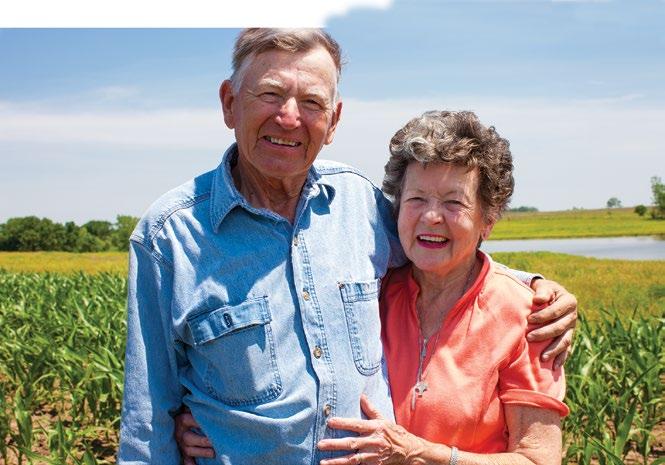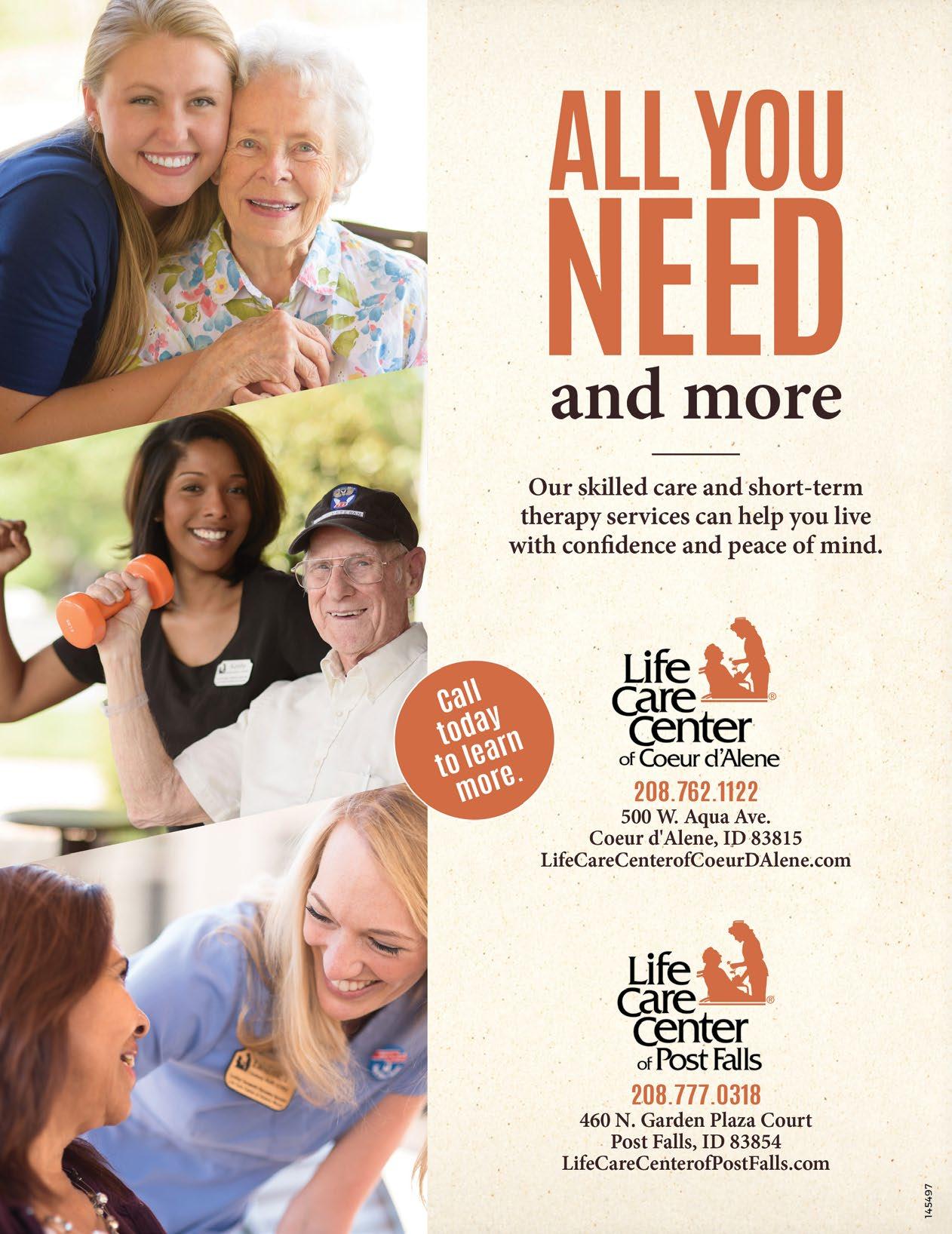
9 minute read
Making the Most of Medicare
Making the by Noreen Brisson, Volunteer Services Coordinator Senior Health Insurance Benefits Advisors (SHIBA)
Most of Medicare
Advertisement
Discharge and Advanced Care/ End of Life Planning
We are living in a world that bombards us with information – some helpful, much of it aimed at selling something, and too much trying to fool us into allowing criminals to access our money and benefits. This can make it hard to know where to look, and trust resources to make decisions, especially when we are feeling vulnerable due to illness or situation. Fortunately, Medicare offers a number of services and tools to help to ensure we can make the most of our healthcare and have a voice in the decisions made – two of these services are Discharge planning and end-of-life Advance Care planning.
Discharge Planning
Effective Discharge planning is one of the easiest ways to support your recovery. Knowing what to ask and what to expect – especially when the hospitalization is for a planned procedure – can help the process.
Things to do to prepare for discharge from a hospital or other in-patient facility: 1. Make sure you and your caregiver are part of the discussion regarding discharge and what is expected to support recovery once home. 2. Have a written list of questions you need answered to feel confident and prepared for discharge. Questions might include, but not be limited to (a) Where will you be getting care next – at home, in a facility as an in-patient, or an out-patient – and who will be providing the care? (b) Will you need to find providers or arrange for medical equipment? 3. Share any concerns related to your situation. Your input is important – it is the only way others can know potential barriers and limitations that may affect your ability to remain safe and recover effectively. 4. Try to gain as sound of an understanding as possible of what to expect and what is expected of you. This can be hard when not feeling well, having the person who will help you later (i.e. spouse, adult child or friend, or case manager) present can help. 5. Find more questions you may want to consider asking
in the Medicare Publication “Your Discharge Planning
Checklist” available on Medicare.gov, Your hospital or care facility may also have this document available.
If you feel services are being stopped or you are being discharged too soon, you have a right to file a fast appeal.
Within 2 days of your admission and prior to your discharge, you should get a notice called “An Important Message from Medicare about Your Rights.” This notice is sometimes called the Important Message from Medicare or the IM. It explains your rights and includes instructions for submitting a fast appeal. If you don’t get this notice, ask your provider for it. With a fast appeal, an independent reviewer will decide if your covered services should continue.
You can contact your Beneficiary and Family Centered Care-Quality Improvement Organization (BFCC-QIO) for help with filing an appeal. You may be able to stay in the hospital (coinsurance and deductible may apply) while the BFCC-QIO reviews your case. The hospital can’t force you to leave before the BFCC-QIO reaches a decision.

Medicare also covers Advance Care Planning with your doctor to make end of life decisions.
This is planning for the care you would get if you become unable to speak for yourself. You can talk about an advance directive with your health care professional, and they can help you fill out the forms, if you prefer. An advance directive is an important legal document that records your wishes about medical treatment at a future time, if you’re not able to make decisions about your care.
If you have original Medicare you pay nothing for this planning if it’s part of your yearly Medicare “Wellness” visit. If it’s provided as part of your medical treatment, the Part B deductible and coinsurance apply.
Consider carefully who you want to speak for you and what directions you want to give. You shouldn’t feel forced to go against your values and preferences, and you have the right to carry out your plans without discrimination based on your age or disability. You can update your advance directive at any time.
Most of the information in the article is compiled from Medicare.gov and Medicare publications. If you have questions about Medicare benefits, Idaho SHIBA staff, partners and volunteers offer free, unbiased information, resources and assistance with plan comparisons and resolving complaints. If you would like help, or are interested in becoming a SHIBA volunteer, please call the SHIBA Medicare Helpline at 800-247-4422.

For more information, please call the SHIBA Medicare Helpline at 800-247-4422 or visit doi.idaho.gov/shiba
Noreen Brisson is a Volunteer Services Coordinator with the Senior Health Insurance Benefits Advisors (SHIBA) program in Coeur d’Alene. She has been a member of the Department of Insurance and SHIBA staff for over 9 years and loves winter and helping fellow Idahoans learn about Medicare. Puzzles on pages 56-57
Let us help you!
Free, Unbiased Medicare Counseling Call SHIBA

Senior Health Insurance Benefits Advisors (SHIBA)
A service of the Idaho Department of Insurance
• Understand your Medicare preventive & wellness benefits • Extra Help & Part D assistance • Individual counseling

This project was supported, in part by grant number 2002IDMISH, from the U.S. Administration for Community Living, Department of Health and Human Services, Washington, D.C. 20201
Simple Cooking for Health Better
by Lenna Kamps, Registered Dietician, Life Care Center Coeur d’Alene & Post Falls
As we age and circumstances change, it can be very difficult to know how to care for ourselves. Many people are finding themselves alone when they have not been for many years. For a variety of reasons, loss of a spouse, medical ailments, lack of energy, etc., we begin to find it challenging to even make food. Fortunately, there are a few things you can do to eat healthy meals without spending hours in the kitchen.
Healthy meals do not need to be complicated. Oftentimes, simpler meals are more healthy. The first concept I’d like to introduce is called “speed scratch.” This is where you use a convenience food as a base for your meal, such as boxed mac and cheese, and add healthier foods to it, such as fresh, frozen, or canned vegetables. You can also add canned tuna or chicken to make a quick, stovetop casserole. The other benefit to the speed scratch method is that fewer perishable ingredients go into it, which is helpful when you are shopping for one person. Keep in mind that canned foods will have more sodium so if your doctor has suggested a cardiac diet, it would be better to add in fresh or frozen items.
Another way to make cooking easier is by batch cooking. Plan to have leftovers and either freeze them or eat them within the next few days. I prefer to not eat anything after 4 days in the fridge but some things are fine up to one week. Cook extra pasta for use in a salad or with a different sauce or cook more than one chicken breast to use for your next meal. In addition to batch cooking, you can also batch prep. For example, if you are using a bell pepper in a recipe, don’t cut what you need for that recipe, cut the whole thing and store it in the fridge. By cooking and prepping more than what you immediately need, you can save yourself time and energy later and it doesn’t take much more effort in the moment.
The last thing I would suggest is meal sharing. If you have a friend or neighbor who also has difficulty planning meals, you can coordinate and trade meals throughout the week. You can utilize the batch cooking method, make extra for


Bean Salad Recipe
Ingredients: 1 can black beans 1 can garbanzo beans 1 can kidney beans 1 ½ - 2 cups of pico de gallo 1-2 cups of chipotle ranch dressing (add more to taste) 1 tbs garlic powder Black pepper to taste Drain and rinse beans. Combine all ingredients together in a large mixing bowl. You can add more dressing or seasoning as needed.
the friend and trade your extras for theirs. This way, you aren’t doing any extra work and you get more variety. Include several people to add greater variety. You can also use this concept by assigning a day of the week for each person to cook, this gives each person some time off from cooking.
Lenna Kamps is a graduate of the University of Idaho’s Coordinated Program in dietetics. She is the registered dietitian for Life Care Center Coeur d’Alene as well as Life Care Center Post Falls. Lenna loves what she does and has a deep appreciation for the people she works with as well as the residents she serves.

Alzheimer’s Association............... Pg 40, 42
Area Agency on Aging of
North Idaho .................................. Pg 48, 53
Compassionate Care
Referral Service .................................... Pg 4 Idaho Breastfeeding Coalition .......... Pg 13 North Idaho CASA.............................. Pg 25 Panther Country Coalition................. Pg 15
SHIBA (Senior Health Insurance
Benefits Advisors) .............................. Pg 59
Assisted Living & Memory Care
Boundary County
Community Restorium....................... Pg 62 The Lodge Assisted Living................. Pg 51
Counseling & Support
Bonner General Behavioral Health ... Pg 27 Family Crisis Network ........................ Pg 28 Peer Spokane................................. Pgs 2, 16
Pend Oreille County
Counseling Services .......................... Pg 57
Financial Planning, Insurance & Legal
Coyle & Eyman Elder Law.................. Pg 45

Advertisers’ Directory
Humana .............................................. Pg 20 Spears Insurance, Inc. ........................ Pg 31
Recreation
Kalispel Park & Casino ....................... Pg 21
Dental, Hearing & Vision
Audiology Research Associates ........ Pg 57 Camas Center Dental Clinic ................. Pg 9 Eye Clinic of Sandpoint....................... Pg 11 Lakeview Dental ................................ Pg 23
Holistic Health
Camas Center Clinic ............................. Pg 9
Hospice
Bonner General Health
Community Hospice........................... Pg 27
Hospitals, Medical Care, Pain Management & Research
Bonner General Health ...................... Pg 27 Camas Center Clinic ............................. Pg 9 Inland Northwest Research ........... Pg 7, 37
Newport Hospital &
Health Services................................... Pg 29
North Idaho Advanced
Care Hospital ............................... Pg 35, 64 Pain Management of North Idaho.... Pg 39 UCSF Dementia Caregiver Project..... Pg 54
In-Home Personal Care
Advanced Care Northwest, LLC ....... Pg 40 August Home Health ........................ Pg 57 FirstLight Home Care ......................... Pg 47
In-Home, In-Patient & Out-Patient Skilled Nursing & Rehabilitation
Bonner General Health
Home Health Services........................ Pg 27
Life Care Center of Coeur d’Alene
& Post Falls ................................... Pg 60, 63 North Idaho Home Health ................. Pg 43
Rehabilitation Hospital
of the Northwest ......................... Pg 35, 64
Veterans
Veterans Resources/
Service Offices..................................... Pgs 32-33












